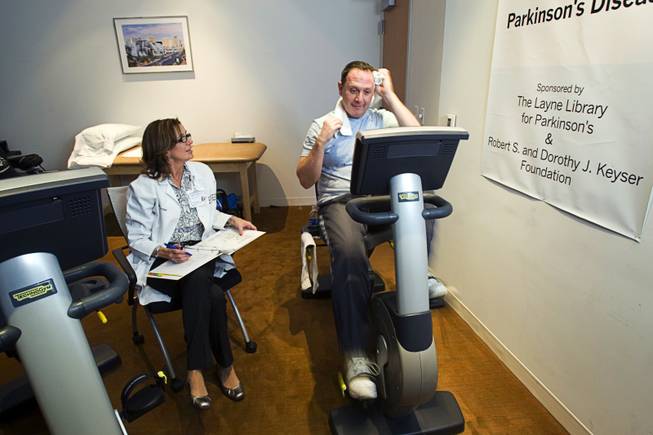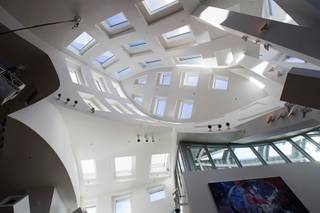
Dean Bengert rides a stationary bicycle at the Cleveland Clinic Lou Ruvo Center for Brain Health Monday, February 6, 2012. Kathy Nagle, a research nurse coordinator, keeps notes at left. Bengert, 52, is participating in a clinical trial that is studying the effect of exercise on patients with Parkinson’s disease.
Tuesday, Feb. 14, 2012 | 2 a.m.

Related stories
- Reporter recalls following Muhammad Ali as boxer found 'more to life'
- Volunteering at the Ruvo Center: How to lend a hand — and a heart
- Vegas gala to celebrate Muhammad Ali's 70th birthday, benefit Ruvo Center
- Lou Ruvo Center helps those afflicted by diseases of memory, mood and movement
- ‘Power of Love’ Muhammad Ali celebration to be broadcast on ABC, ESPN2
When the Cleveland Clinic Lou Ruvo Center for Brain Health opened to patients in July 2009, one of its primary objectives was to provide a place for Las Vegas residents suffering from Alzheimer’s disease and other neurodegenerative diseases to obtain treatment locally.
Now in its third year of operation, the center has only expanded on that mission, offering new programs focusing on multiple sclerosis and Parkinson’s disease and an expanding community outreach program providing free services for caregivers.
Lydia Woltag has called Las Vegas home for 12 years and has lived with multiple sclerosis for 15 years. When her doctor moved away in 2009, leaving her among 1,500 local multiple sclerosis patients looking for a new physician, she became so frustrated in her search that she considered going to Los Angeles for care.
“For a lot of neurologists, if they don’t specialize in multiple sclerosis, it stresses them out,” she said. “A lot of multiple sclerosis patients don’t get the care they need.”
But in July 2011, Woltag and the estimated 2,500 multiple sclerosis patients in the Las Vegas area got welcome news when Dr. Timothy West, a multiple sclerosis specialist whose mother has the disease, moved into the center.
Woltag, who has worked as a volunteer at the Ruvo Center since it opened, quickly signed up for a visit. After leaving West’s office, she was ecstatic and called the Nevada Chapter of the Multiple Sclerosis Society.
“I told them: ‘Send everyone to Dr. West.’” Woltag said. “It was like wildfire because so many people had been waiting for a specialist. Everyone is crazy for Dr. West. He’s compassionate, he understands, and he takes his time with you.”
At the same time West set up shop, the center also brought in Dr. Ryan Walsh to head a Parkinson’s disease and movement disorders program.
Venetian cage cashier Dean Bengert, 51, was diagnosed with Parkinson’s four years ago.
He said he visited three different doctors and traveled to the Mayo Clinic in Arizona before getting a correct diagnosis. He is now participating in a clinical trial at the Cleveland Clinic, exploring exercise therapy for Parkinson’s disease.
“It’s a huge help; just to know there’s a place here to find help is a great convenience,” he said while working up a sweat on a stationary bike. “It’s amazing. It’s much better than sitting around feeling sorry for yourself.”
Citing the city’s reputation for offering lackluster health care services, Bengert said he “never ever” would have imagined the resources like those at the Cleveland Clinic could be found in Las Vegas.
Yet, not all local residents may believe the center is open to them. Ruvo Center administrators worry the clinic is considered too elite to be accessible to local patients, but founder Larry Ruvo said it’s a misconception that locals can’t get in.
Eighty percent of Ruvo Center patients to date have been from Nevada, administrators say, and the center is working with all major health insurance companies to provide access.
“If anybody thinks they can’t get in, all they’ve got to do is call,” Ruvo said.
In addition, more than 200 of the 245 patients currently participating in the center’s multiple clinical trials are from Southern Nevada, according to Dr. Kate Zhong, the Ruvo Center’s senior director of clinical research development.
While the center administration strives to add specialties in areas of need for the community, the services targeting Las Vegans do not stop there. The center’s social services department has established a robust program for caregivers, many of whom are left with far more questions than answers when their loved one is diagnosed with a degenerative disorder.
There is a lending library where local residents can check out books about a wide range of medical topics, support groups, educational luncheons and counseling. All of the services are free and open to everyone, regardless of where the patient is receiving treatment.
Support services for caregivers are vital to the care of the patient. Studies have shown that 25 to 40 percent of caregivers develop depression, according to Susan Hirsch, director of social services at the center.
“Caregiving for someone with Alzheimer’s is isolating by its very nature,” Hirsch said. “We try and offer multiple avenues for the caregivers to access resources and meet other individuals in similar positions. A lot of caregivers are apprehensive to reach out for support. We provide a source of support as well as a connection to others while they are going through a challenging time in life.”
Sun Staff Reporter Conor Shine contributed to this report.


Join the Discussion:
Check this out for a full explanation of our conversion to the LiveFyre commenting system and instructions on how to sign up for an account.
Full comments policy